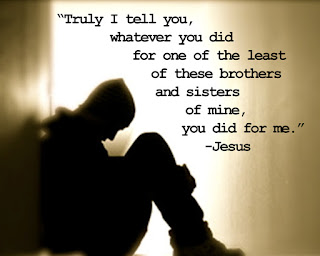The Faith of Mr. Rogers, Week 7
This year I've been going through a new book, "The Simple Faith of Mr. Rogers." Written by Amy Hollingsworth, a minister and friend of Fred Rogers, it chronicles nine simple lessons she learned about faith from him. I've read it through a couple times, and have been looking at it with my Sunday School Group. Over the next few weeks, I'll be offering short reflections on what I've learned from each segment.
The seventh Toast Stick is about The Least of These. And this is a powerful chapter. The first three Toast Sticks were about the life of the mind, the second three were about how we see the world, ourselves and others. These final three Toast Sticks are about what we can do to make a difference. Fred Rogers saw those that others didn’t, and he spent his life trying to get them to see their own worth and, better yet, feel loved. This chapter begins with a touching story of a disabled choir giving their all to glorify the Lord, and quickly turns to remembering when Fred, seeing that public television was in danger of losing its funding, making an impassioned plea that the money, and the resource it provided, was vitally important for a group left on the margins. It was a fight he won in 1969, and a fight he continued to battle all the days of his life. Fred was deeply passionate about the idea of no child being left behind before it was a catchy piece of legislation.
He cared about children, and those who felt disenfranchised, and he worked to try to make them feel included. His legacy, and the fact we're talking about him more than 15 years after his death, is a testament to the efficacy of those efforts. Fred cared, and truly felt everyone should be included.
He was also driven by the idea that in tough times, those who could were called to step in and help. This was born of a moment from his childhood when he was distressed by the dark events he saw on the news. His mother encouraged him that, even in tough times and situations, there was always people helping. She urged him to "Look for the helpers." And that's what he did. And those helpers he saw became heroes in his life. People like his professor Dr. Orr, who reached out to those in need. Or Henri Nouwen, the writer who pastored a church of those in need, including a disabled man he served daily. Or William Wasson, who went to Mexico to end his ministry and instead founded a ministry that has touched more than 6,000 lives. All those stories are chronicled in the chapter, and linked back to the idea that our call as Christians, given by Jesus in the passage above, is to help the least of these.
There are plenty of powerful stories like this. I remember that was what drew me to the film "The Blind Side," which tells the story of a family who adopted a teen that needed home and support. It's an inspirational story, and it's a true story. And it exemplifies the call to serve. We can't all go to Mexico and start a mission, or adopt a teen in need of a home, or pastor the physically disabled, but we can all do something. And we should all do something.
The final piece of the chapter was perhaps the most profound. Amy ponders what drove Fred to fight this battle. She tells the story of a young Fred Rogers being bullied, and how that changed the course of his life. It was a moment, she notes, where he could have become withdrawn, or turned into a bully himself. But instead, it drove him to want to help and heal the broken areas in others.
She wrote, “Fred’s intense devotion to the disenfranchised, to the least of these, arose from the realization he was one of them.” Fred took a tough time and turned it into a wonderful life's mission. How can we go, and do likewise?




Comments
Post a Comment